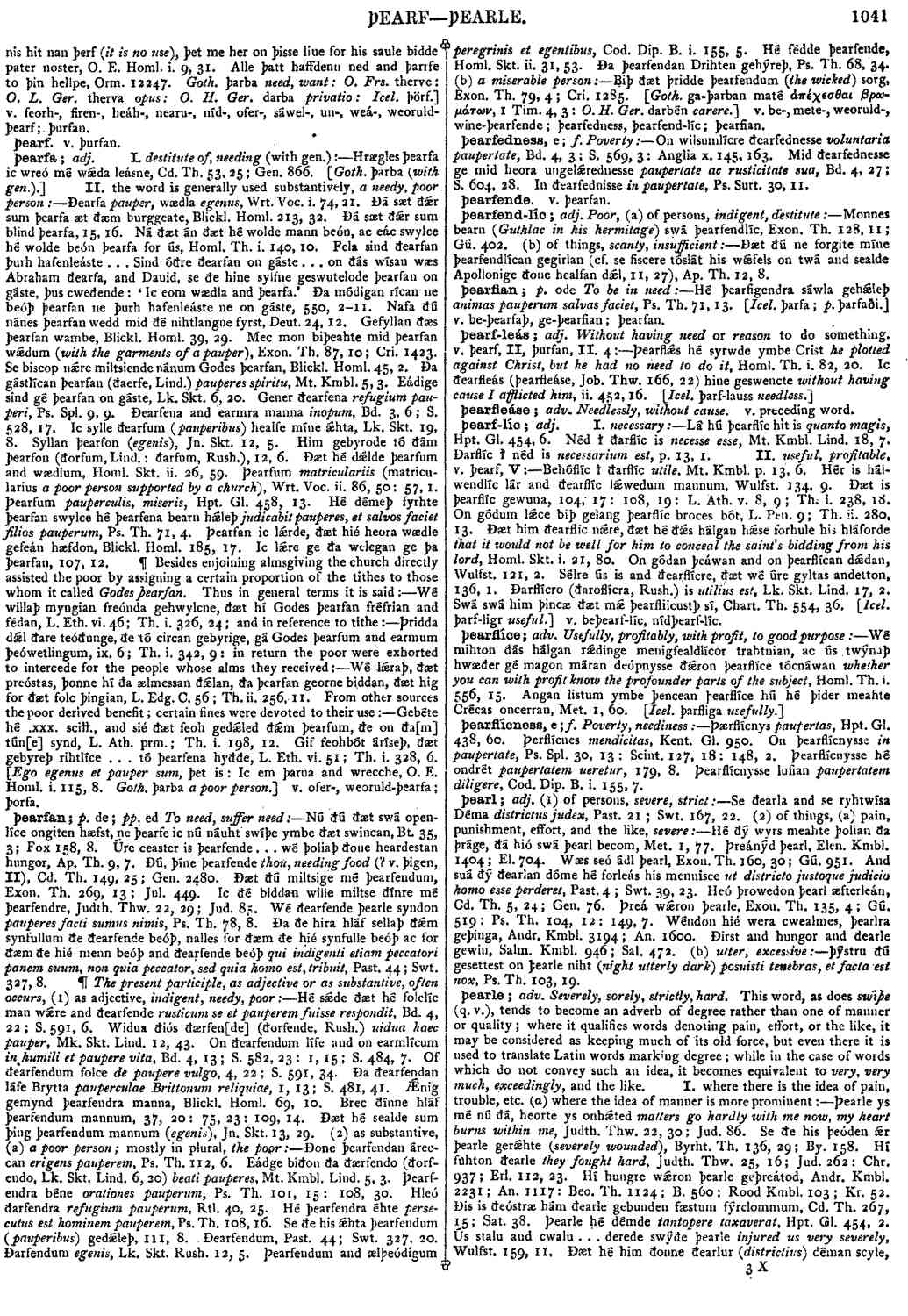þearle
- adverb
-
Þearle ys mé nú ðá, heorte ys onhǽted
matters go hardly with me now, my heart burns within me,
- Judth. Thw. 22, 30; Jud. 86.
-
Se ðe his þeóden ǽr þearfe gerǽhte (
severely wounded
),- Byrht. Th.
136, 29; By. 158.
-
Hí fuhton ðearle
they fought hard,
- Judth. Thw. 25, 16; Jud. 262: Chr. 937; Erl. 112, 23.
-
Hí hungre wǽron þearle geþreátod,
- Andr. Kmbl. 2231; An. 1117: Beo. Th. 1124; B. 560: Rood Kmbl. 103;
Kr. 52.
-
Ðis is ðeóstræ hám ðearle gebunden fæstum fýrclommum,
- Cd. Th. 267, 15; Sat. 38.
-
Þearle hé démde
tantopere taxaverat,
- Hpt. Gl. 454, 2.
-
Ús stalu and cwalu ... derede swýðe þearle
injured us very severely,
- Wulfst. 159, 11.
-
Ðæt hé him ðonne ðearlur (
districtius
) déman scyle,- Past. 53; Swt. 419, 5.
-
Sáwl mín gedréfed is ðearle
anima mea turbata est valde,
- Ps. Spl. 6, 3.
-
Geeádmét ic eom ðearle (
nimis
),- 37, 8: Ps. Th. 78,
8.
-
Þearle ic deorfe
nimium laboro,
- Coll. Monast. Th. 19, 13.
-
Forþóht þearle (cf. swíþe unrót,
- Bt. 1; Fox 4, 4), Met. 1, 82.
-
Ðæt folc wearð þearle geswenct mid ðam síðfate
taedere coepit populum itineris ac laboris,
- Num. 21, 4: Ps. Th. 103, 8: Homl. i. 80, 14.
-
Geðancas þearle deópe
nimis profundae cogitationes,
- Ps. Th. 91, 4.
-
Þearle mildheort
multum misericors,
- 144, 8: Judth. Thw. 22, 23; Jud. 74.
-
Swíðe gelýfed mann and ðearle eáwfæst,
- Homl. Th. ii. 306, 4.
-
Ðú eall geworhtest þing þearle gód (cf. swíþe góde,
- Bt. 33, 4; Fox 128, 22), Met. 20, 45.
-
Behéfe þearle
utilis valde,
- Coll. Monast. Th. 27, 27: 29, 31.
-
Þearle deóplíce
valde profunde,
- 32, 9.
-
Þearle swíþe tó herienne,
- Lchdm. iii. 436, 18: 438, 27.
-
Hé geíhte folc his ðearle (
vehementer
),- Ps. Spl. 104,
22.
-
Þearle fremaþ cræft mín eów
multum prodest ars mea vobis,
- Coll. Monast. Th. 28, 7: Judth. Thw. 26, 3; Jud. 307.
-
Ic ðé gemenigfilde swíþe þearle (
vehementer nimis
),- Gen. 17,
2.
-
Dríg swýþe þearle
dry very thoroughly,
- Lchdm. i. 70, 10.
-
Ðis godspel belimpþ swíðe þearle tó ðære mǽran freólstíde
this gospel belongs very specially to the great festival,
- Homl. Th. ii. 360, 10.
-
Hig þearle etaþ
nimium comedunt,
- Coll. Monast. Th. 26, 11.
-
Gehwylc mé drincan sealde þearle
each gave me abundance to drink,
- Exon. Th. 485, 1; Rä. 71, 7.
-
Drinc swýþe þearle
drink very largely,
- Lchdm. i. 78, 10.
-
Hit on wolcnum oft þearle þunraþ,
- Met. 28, 25.
Bosworth, Joseph. “þearle.” In An Anglo-Saxon Dictionary Online, edited by Thomas Northcote Toller, Christ Sean, and Ondřej Tichy. Prague: Faculty of Arts, Charles University, 2014. https://bosworthtoller.com/31576.
Checked: 0